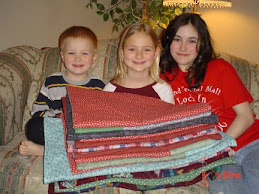 Exciting new ........................... drum roll ..........
Exciting new ........................... drum roll ..........The Commission voted for a "Stay of Enforcement of Certain Testing and Certification Requirements of CPSIA" — which means they are proposing a 1 year suspension of the burden of lead testing and certification while they take more time to review the rules and plan enforcement! All those letters, phone calls and emails paid off (for once). You will still be liable if your products are found to have lead. The work is not over but we have breathing space now for a year.
You can read the press release below:
CPSC Grants One Year Stay of Testing and Certification Requirements for Certain Products
Washington, D.C. – The U.S. Consumer Product Safety Commission voted unanimously (2-0) to issue a one year stay of enforcement for certain testing and certification requirements for manufacturers and importers of regulated products, including products intended for children 12 years old and younger. These requirements are part of the Consumer Product Safety Improvement Act (CPSIA), which added certification and testing requirements for all products subject to CPSC standards or bans.
Significant to makers of children’s products, the vote by the Commission provides limited relief from the testing and certification requirements which go into effect on February 10, 2009 for new total lead content limits (600 ppm), phthalates limits for certain products (1000 ppm), and mandatory toy standards, among other things. Manufacturers and importers – large and small – of children’s products will not need to test or certify to these new requirements, but will need to meet the lead and phthalates limits, mandatory toy standards and other requirements.
The decision by the Commission gives the staff more time to finalize four proposed rules which could relieve certain materials and products from lead testing and to issue more guidance on when testing is required and how it is to be conducted.
The stay will remain in effect until February 10, 2010, at which time a Commission vote will be taken to terminate the stay.
The stay does not apply to:
Four requirements for third-party testing and certification of certain children’s products subject to:
The ban on lead in paint and other surface coatings effective for products made after December 21, 2008;
The standards for full-size and non full-size cribs and pacifiers effective for products made after January 20, 2009;
The ban on small parts effective for products made after February 15, 2009; and
The limits on lead content of metal components of children’s jewelry effective for products made after March 23, 2009.
Certification requirements applicable to ATV’s manufactured after April 13, 2009.
Pre-CPSIA testing and certification requirements, including for: automatic residential garage door openers, bike helmets, candles with metal core wicks, lawnmowers, lighters, mattresses, and swimming pool slides; and
Pool drain cover requirements of the Virginia Graeme Baker Pool & Spa Safety Act.
The stay of enforcement provides some temporary, limited relief to the crafters, children’s garment manufacturers and toy makers who had been subject to the testing and certification required under the CPSIA. These businesses will not need to issue certificates based on testing of their products until additional decisions are issued by the Commission. However, all businesses, including, but not limited to, handmade toy and apparel makers, crafters and home-based small businesses, must still be sure that their products conform to all safety standards and similar requirements, including the lead and phthalates provisions of the CPSIA.
Handmade garment makers are cautioned to know whether the zippers, buttons and other fasteners they are using contain lead. Likewise, handmade toy manufacturers need to know whether their products, if using plastic or soft flexible vinyl, contain phthalates.
The stay of enforcement on testing and certification does not address thrift and second hand stores and small retailers because they are not required to test and certify products under the CPSIA. The products they sell, including those in inventory on February 10, 2009, must not contain more than 600 ppm lead in any accessible part. The Commission is aware that it is difficult to know whether a product meets the lead standard without testing and has issued guidance for these companies that can be found on our Web site.
The Commission trusts that State Attorneys General will respect the Commission's judgment that it is necessary to stay certain testing and certification requirements and will focus their own enforcement efforts on other provisions of the law, e.g. the sale of recalled products.
Please go to the CPSC Web site for more information.
Now I can get back to quilting for charities............ YAHOOOOOOOOOOOOoooooo







